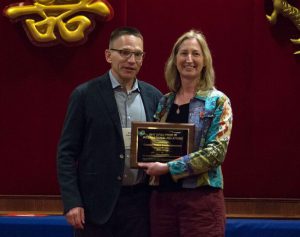
When political science professor Juliet Johnson was in high school, she wanted to be a biochemist. In fact, she’s pretty sure the reason she was accepted into Stanford was because she won the Arizona State Science Fair. During her freshman year at Stanford, while focusing mainly on science, she took a class on the history of the Soviet Union. “I didn’t know anything about the Soviet Union or the Soviet experience, and I became fascinated,” says Johnson. “It quite literally changed my life, that particular course, so I changed my major and started studying Russian, and just got sucked in.”
A few decades later, Johnson’s fascination with Russia and the post-communist world hasn’t dissipated, and her interest in the transformation of the former Soviet bloc has translated into valuable, award-winning research. On May 31, Johnson was awarded the Canadian Political Science Association (CPSA) Prize in International Relations for her second book, Priests of Prosperity: How Central Bankers Transformed the Postcommunist World. Published in 2016, Priests of Prosperity, which was also shortlisted for the Donner Prize, was hailed by the jury as a “major contribution to the study of International Political Economy and Central and East European post-communist transition.”
 The book is the story of how institutions that were designed for one thing – to be the accounting arms of a command economy – were turned into something entirely different: central banks that can run monetary policy, do banking supervision, and function in a capitalist economy. This was not, Johnson argues, simply an internal change, but the result of great efforts on the part of the transnational central banking community to design training and technical assistance programs to support the shift to a functioning capitalist economy.
The book is the story of how institutions that were designed for one thing – to be the accounting arms of a command economy – were turned into something entirely different: central banks that can run monetary policy, do banking supervision, and function in a capitalist economy. This was not, Johnson argues, simply an internal change, but the result of great efforts on the part of the transnational central banking community to design training and technical assistance programs to support the shift to a functioning capitalist economy.
Johnson started her research in February 2000, and at the time had no idea that she would spend more than a decade conducting interviews and working on this project.
“As I was writing and working, things happened, like Hungary, the Czech Republic, and Slovakia joining the EU, which had a major impact on these transformation processes,” Johnson explains. “I conducted the first round of interviews in Russia right after Putin came to power, so there was a great deal of evolution after that. Similar things happened in Kyrgyzstan, and then of course, you had the global financial crisis, which again affected not only the post-communist countries, but the central banks of the countries that were doing the training. In many ways, it undermined the legitimacy of the model that they had been transmitting to these post-communist countries for so many years, so I definitely had to take that into account in the book.”
In the middle of her research, in 2003, Johnson moved to Montreal to work at McGill. As a new Canadian, Johnson feels especially honoured to have received the CSPA Prize in International Relations. “This is a community that’s welcomed me from the beginning, and has been very professionally nurturing. To have my work recognized in this way, with an award like this – that is only given out every two years – is really quite meaningful.”
While Johnson may have spent 14 years working on this book, it is because she has many other research interests. The classes she teaches at McGill include an introduction to Russian politics, and a course called ‘Memory, Place and Power,’ which looks at monuments and memorials in both post-communist and North American contexts, and “how publics and government use and battle over public space to capture the symbolic capital that’s embedded in them.”
Johnson is also co-director of the Jean Monnet Centre Montreal, a joint-centre with McGill and the University of Montreal.
When asked if she thought that the project would never end, Johnson laughs. “I knew I would finish it! The idea is that you can go slowly, but just don’t stop! Bit by bit, it got researched, it got written, it got done.”
“Given that this was quite a big project, I’m glad I took the time to get it right,” Johnson continues. “If I had published it more quickly I would have missed out on some important events that I wouldn’t have been able to integrate. I also wouldn’t have had the time to think through some of the big theoretical arguments that I wanted to make. In the end, even though it took a long time, I’m very happy with the outcome and I think it’s a better book for it.”
